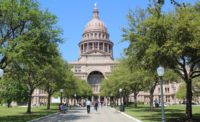The Summit brought together 80 leaders from the business community who spent part of the day meeting with Senator John Kyl (R-AZ) and other supporters of permanently repealing the onerous estate tax. Senator Kyl advised the Summit participants that he does not intend to bring the bill up for a Senate vote until he can be sure he has the votes to pass. In this case, 60 votes are required to cut off debate from the opposition. The Summit participants spent the remainder of the day in private meetings with their Senators and staff members.
Ramsey and Calderon, along with ASA's legislative advocate Pat O'Connor, first visited with representatives of Senators Bill Frist and Lamar Alexander, both Republicans from Tennessee, where Ramsey's company, Modern Supply Co., is headquartered. Not surprisingly, both Senators are very favorably disposed to supporting permanent repeal, indicating that they expected to vote with Senator Kyl.
On the other hand, staff members in the offices of Senators Dick Durbin and Barack Obama, both Democrats from Illinois (ASA's headquarters is located in Chicago), said that their votes would not likely be cast in favor of permanent repeal. Instead, Durbin's aide said that the Senator would rather support a measure that exempts direct lineal descendants from the tax, while keeping the tax in place for others. Obama's aide was open to our opinions and said that while the Senator does not favor permanent repeal, he is still gathering information. ASA will be following up to send some statistical information about how the PHCP industry's family businesses have been affected by the death tax.
ASA wholesalers and manufacturers who would like to get involved with helping to get this tax repealed are urged to contact their Senators' offices directly to express your support. If you would like more information to help fuel your message, contact Inge Calderon at ASA (ingec@asa.net or 312-464-0090).
Sidebar: UNFAIR AND INEFFICIENT!
The estate tax is one of the most unfair and inefficient taxes on the books
- It is a tax on income that has already been taxed once and sometimes twice.
- It is a tax with effective rates ranging from 45 to 47 percent.
- It is a tax that brings in only 1.1 percent of total federal revenues.
- It costs the federal government almost as much to enforce as is collected.
- It penalizes hard work, savings and investment, while rewarding consumption.
- It slows economic growth, causes the loss of jobs, and limits job creation.




